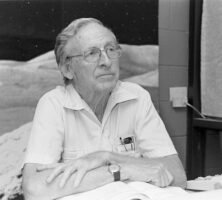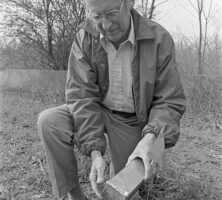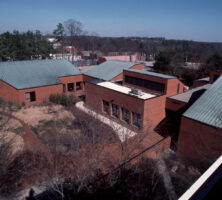Eugene Pleasants Odum, called “the father of modern ecology,” brought the word ecosystem into common parlance by making it the organizing concept in his 1953 Fundamentals of Ecology. Through that textbook, which was translated into twelve languages, and through his many other books and articles, he led the way toward the study of nature in terms of ecosystems, and with his brother, the ecologist Howard Thomas Odum, powerfully influenced the development of ecosystem ecology.
Life
Odum was born in Newport, New Hampshire, on September 17, 1913. His parents, Anna Louise Kranz and Howard Washington Odum, were vacationing there to escape the summer heat of Athens, where the senior Odum served on the faculty of the University of Georgia. Howard W. Odum later gained national prominence as a sociologist at the University of North Carolina at Chapel Hill, as founder of the journal Social Forces, and as one of the founders of the Southern Regional Council.
Eugene Odum grew up with his younger siblings, Mary Frances and Howard Thomas, in Chapel Hill, where he developed his lifelong interest in ornithology. He obtained his A.B. and A.M. in zoology from the University of North Carolina in 1934 and 1936, respectively, and his Ph.D. in zoology, with a major in ecology, from the University of Illinois in 1939. He married Martha Ann Huff in 1939, served the 1939-40 academic year as resident naturalist at the Edmund Niles Huyck Preserve in Rensselaerville, New York, and joined the Department of Zoology at the University of Georgia in the fall of 1940. He and Martha had two sons, William Eugene and Daniel Thomas. Martha, who had graduated from the University of Illinois with a degree in design, became a leader in the Athens art community, and William followed his father and his uncle into ecology, ending his career at the University of Virginia in 1991 when he died of liver cancer. Martha died of cancer in 1995.
Odum retired from the University of Georgia in 1984, leaving his position as director of the Institute of Ecology, Alumni Foundation Distinguished Professor of Zoology, and Callaway Professor of Ecology. He had been instrumental in the founding of the university’s Savannah River Ecology Laboratory, University of Georgia Marine Institute on Sapelo Island, and the Institute of Ecology, which in 2007 was renamed the Eugene P. Odum School of Ecology in his honor.
Odum died of natural causes after tending his garden at his Athens home on August 10, 2002. “He was the best-known ecologist in the world, there’s no question about that,” said a colleague, University of Georgia ecology professor Whit Gibbons.
Contributions to Ecosystem Ecology
During the 1950s Odum took advantage of the U.S. government’s interest in building atomic weapons facilities and in commissioning preinstallation environmental inventories of their sites to engage University of Georgia graduate students and faculty in ecological field studies. With a grant in 1951 from the U.S. Atomic Energy Commission (AEC), he initiated at the Savannah River nuclear plant a program of long-term ecological research that would eventually become the university’s Savannah River Ecology Laboratory. A decade later, encouraged by the growing national interest in radiation ecology, or radioecology, Odum and his colleagues began planning an on-campus Institute of Radiation Ecology, which would become the University of Georgia Institute of Ecology.

Courtesy of University of Georgia Photographic Services
In 1954 Eugene Odum and his brother acquired another grant from the AEC to study the effects of nuclear fallout in the Eniwetok Atoll of the South Pacific, where the U.S. government had been testing atomic weapons. In a paper that won the 1956 Mercer Award from the Ecological Society of America, they proved that the coral reef was maintaining itself in equilibrium because of the symbiotic relationship of the coral and the algae. Odum was to use that discovery again and again in his argument that symbiosis promotes stability.
In 1964, as president of the Ecological Society of America, Odum announced in the journal BioScience the establishment of a “new ecology,” a “systems ecology” that dealt with the world as a whole, bringing all of the ecosystem sciences together. In the article he laid out the discipline’s fundamental assumptions: that the ecosystem is the basic unit of nature; that biological diversity increases ecosystem stability; that “homeostasis” is important at all levels of the biological spectrum; that “the whole is greater than the sum of its parts”; and that therefore reductionist scientific methods cannot adequately explain living systems.

Courtesy of University of Georgia Photographic Services
These were the premises on which Odum based his science and with which he would thereafter be identified. The statement “the ecosystem is greater than the sum of its parts” is inscribed on the bust of him that adorns the entrance to the Ecology Building at the University of Georgia.
Contributions to Environmentalism
In the late 1960s, when land developers and a mining firm threatened the survival of Georgia’s coastal wetlands, Odum participated in a University of Georgia student–driven Save Our Marshes Committee by educating citizens about the economic value of the wetlands to the state. With the support of the newly informed voters, the committee succeeded in persuading the Georgia legislature to pass the Coastal Marshlands Protection Act of 1970.
Video by Darby Carl Sanders, New Georgia Encyclopedia
In 1970, the year Americans celebrated the first Earth Day, when environmentalism was capturing the public’s imagination, Odum obtained national notice in the media—in Time, Newsweek, and other popular publications—as one of the world’s leading ecologists. His widely selling textbook Fundamentals of Ecology, the third edition of which was soon to be published, had influenced the environmentalist movement by showing the interconnectedness of nature and the effects of human intervention in ecosystems.
In the 1980s and 1990s Odum put the principles of ecosystem ecology in the service of environmentalism, and in 1998 he encapsulated his ideas in the book Ecological Vignettes: Ecological Approaches to Dealing with Human Predicaments.
Odum’s achievements have been widely recognized through a number of distinguished honors and awards. In 1970 he was elected to the National Academy of Sciences, and the following year he was named the Outstanding Educator of America. International honors include honorary membership in the British Ecological Society (1974), the Prix de l’Institut de la Vie (1975), and the Crafoord Prize in Ecology from the Royal Swedish Academy of Science (1987), the latter two of which he shared with his brother, Howard Odum. He has also received six honorary degrees, including two from universities in Guatemala and Ecuador.
Odum acquired considerable wealth during his life, primarily from books but also from prizes. He gave away approximately $1.5 million, mostly to the University of Georgia but also to the University of Virginia, in honor of his son, and to the University of North Carolina and the University of Illinois. With generous donations he helped create the Eugene P. Odum Professorship at the University of Georgia and the Martha and Eugene Odum Gallery of Decorative Arts at the Georgia Museum of Art.










